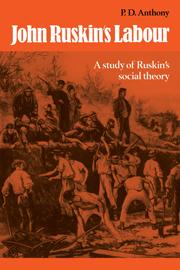Summary
We began this discussion of Ruskin by suggesting that a good reason for undertaking it was that no other writer revealed so well the complex quality of work. The extent to which this claim is justified deepens the problems at hand. It is not easy to understand what Ruskin makes of work because he seems never quite to make up his mind about it. He was often accused of self-contradiction and in his Cambridge inaugural address he appeared to have brushed the criticism aside with a genial confession:
I never met with a question yet, of any importance, which did not need, for the right solution of it, at least one positive and one negative answer, like an equation of the second degree. Mostly, matters of any consequence are three-sided, or four-sided, or polygonal; and the trotting around a polygon is severe work for people in any way stiff in their opinions. For myself, I am never satisfied that I have handled a subject properly till I have contradicted myself at least three times.
The point is a serious one. He had some, perhaps slight, acquaintanceship with Hegel but Ruskin differs from the German dialectical logic in his refusal to believe that the necessary closure of contradictions by synthesis is anything other than ‘stiff’. Ruskin suggests that truth must embody contradicting statements so that it is itself likely to be contradicted by the superimposition of any simplifying synthesis.
- Type
- Chapter
- Information
- John Ruskin's LabourA Study of Ruskin's Social Theory, pp. 148 - 172Publisher: Cambridge University PressPrint publication year: 1984



